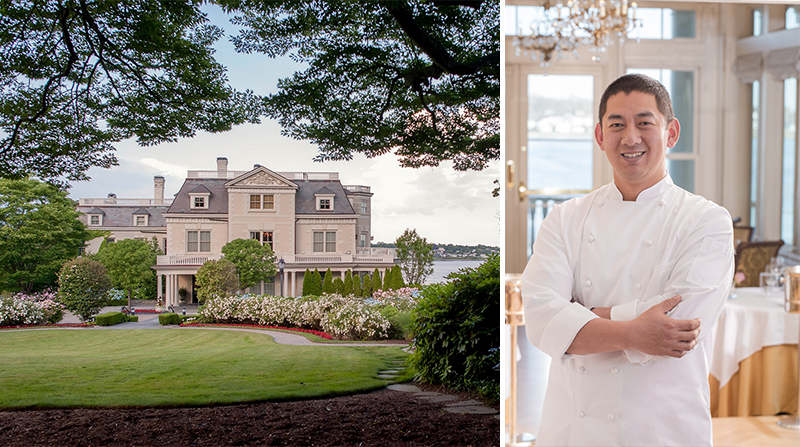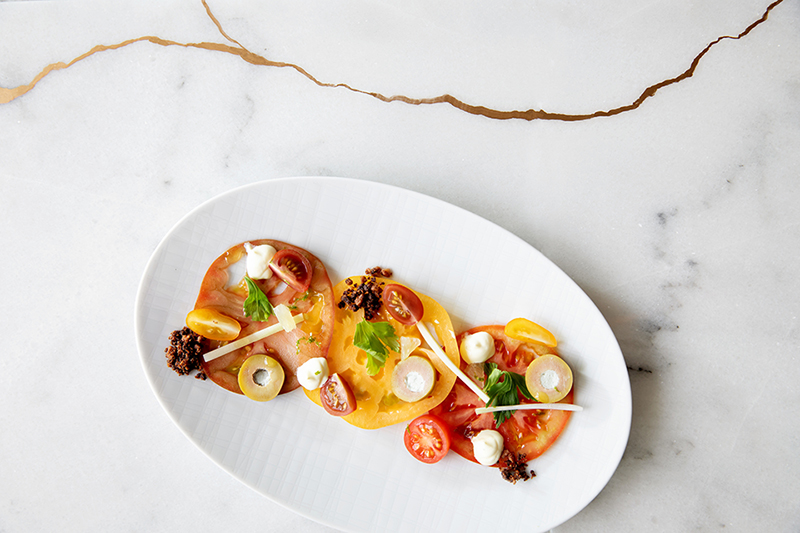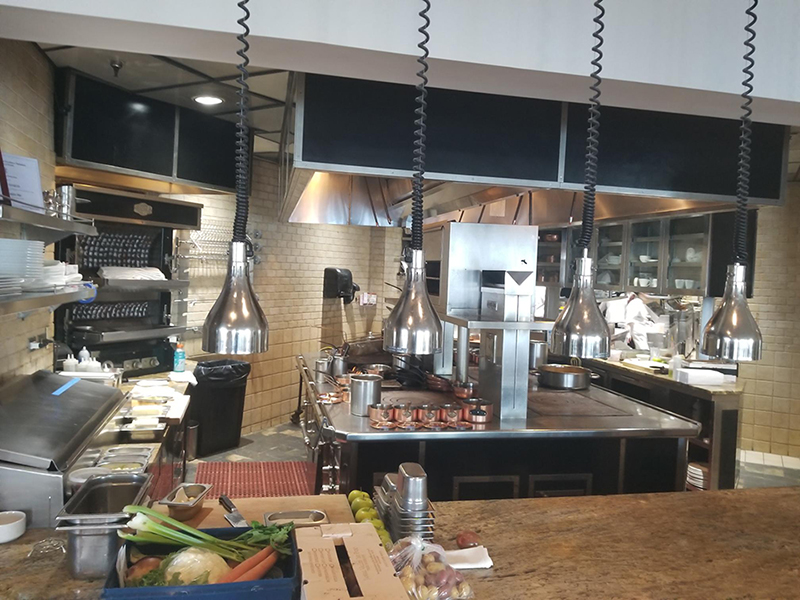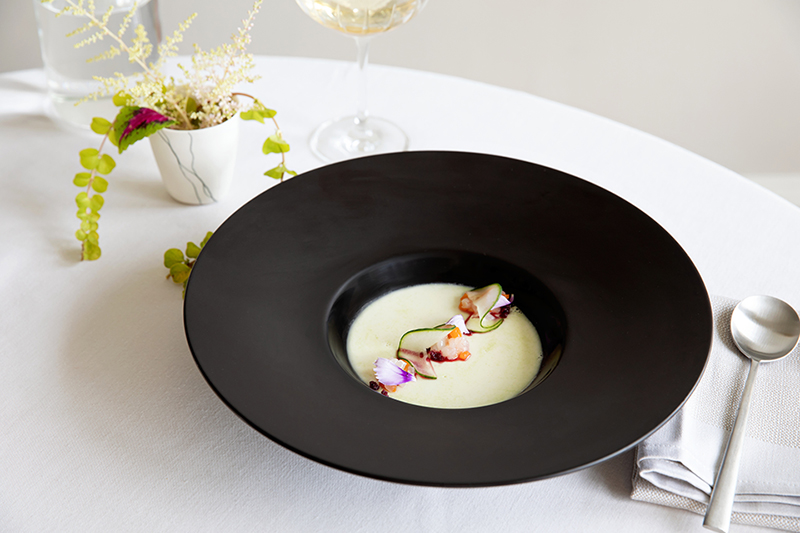
Chef Matt Voskuil talks about salmon roe much in the way Kehinde Wiley might discuss oil paintings or Eric Clapton could expound on guitar strings. It’s a genuine, unadulterated love.
“We pair [the roe] with a romanesco to bring that nice brininess without having to eat a lot of fish,” Voskuil says about the menu highlight at Cara, the new culinary centerpiece at Forbes Travel Guide Recommended Hotel The Chanler in Newport, Rhode Island. “It provides a little bit of structure for the wine pairings, too. [It helps] those distinct flavors that we’re used to associating with fish, white wine and things like that. It really just helps make the experience more cohesive and put it into a context that people are a little bit more familiar with.”
The Chanler knew precisely what it was doing by luring Voskuil away from Las Vegas, where he had worked with some of the industry’s biggest names, from Michael Mina to Joël Robuchon, back in early 2018. The hotel needed a visionary who could take its epicurean program into a bold, fresh direction and the South Korea-born, Wisconsin-bred Voskuil was up to the task.
“We really wanted to be able to take Cara a few steps beyond what’s normal around here and do something that’s really special,” Voskuil said of the bright, beautiful eatery that replaced The Chanler’s Spiced Pear in July.
“I feel like we’ve done a good job of accomplishing that. We were looked at a little warily from people sometimes. People didn’t quite know what to expect. [Cara] is a departure from what it was previously. It might not be things that they’ve seen before or combinations they might have considered on their own, but once it’s on a plate in front of you and you’re enjoying it, you’re like, ‘Oh, okay, we get it.’”
After sitting with chef Voskuil over lunch recently, we get it, too. The Chanler has found itself an artist who’s ready to add a splash of color to Rhode Island’s classic fine-dining scene.
What makes Cara special?
We wanted to do something with this restaurant that was just a little more modern. The idea was to take the “Newport mansion” concept, bring it forward by about 100 years. If the mansions were still being used in the way they had been intended when they were built and the families still kept them up as summer homes, what would dining be like in the mansions today? Cara is our vision of how that would be.
What changes have you made cooking for a Rhode Island audience versus a Vegas one?
I haven’t had to make many changes yet. I was asked to join the team here because I bring a certain perspective to things. A dinner here should be special. A dinner here should be notable.
We try to source things as locally as often as possible, but I will always go for better. Better trumps local. The wagyu beef comes from Idaho, Southern Idaho/Northern Wyoming. Snake River Farms has farms in those areas. To me, locally, there really isn’t anything comparable. We want our guests to experience the best product at all times.
Obviously, along the New England area, there’s an abundance of seafood. We get all of our seafood locally. We do get a lot of our produce locally. The mushrooms are foraged locally.
There are local elements, but I don’t want to pigeonhole myself into saying that it’s “local cuisine” because then I feel like if some of the [non-local] things that we like to use can really put an experience over the top, we’d be hypocritical or deceptive.
You were born in Seoul and raised in Wisconsin. Have those places influenced your cooking?
My Korean roots don’t have much a bearing on my cooking. I came over when I was 5 months old. I don’t know it. I feel like that’s something I could address in the future. But let’s face it, I’m 43 and I haven’t figured it out yet. I don’t know if I ever will.
In terms of my Midwestern roots, I feel like the appreciation for dairy, good cheese, fresh-picked produce [comes from there]. I remember pulling over on the side of the road and grabbing ears of corn. I remember picking apples and making things with them.
My dad had a game farm. Every Sunday, [the boys] would let 30 pheasants out of the pen. We’d cook pheasant for dinner and stuff like that. We’d go deer hunting and duck hunting. I grew up in a relatively rural part of Wisconsin and we just learned how to do those things.
I was always intrigued by cooking. My mom was an awful cook, so somebody had to figure out how to do it. We always had an abundance of food, so it was always like, “Okay, what can we tinker on and figure out?” I took up that role.
Would you say you’re self-taught?
No. I started working in restaurants when I was 14. My dad owned a jewelry store, and right next door was a restaurant. So, I started working at the restaurant. I was a dishwasher. I became a cook very shortly thereafter. I did that throughout high school.
Before my senior year, I went to go work at a country club because I liked playing golf. I went there thinking I could cook and also have access to these golf courses. It was there, for the first time, that I worked with European chefs. We had French chefs. I couldn’t understand what they were saying but the food they were doing was really cool, and I liked doing it.
In the summer between by senior year and college, I was like, “I might be interested in this as a career.” I did one year of college and then I went to culinary school after that. Spent 10 years in Chicago and then ended up going to Las Vegas.
I identified Las Vegas as a great city for fine dining, golf courses and some of the other things I enjoy doing. I spent 14 years there. Managed to get hooked up with the right people right from the get-go. My first job was at Aqua, which transitioned to Michael Mina at the Bellagio.
I was there for only a couple of months because the chef was leaving to go open the Wynn. Steve Wynn was looking for a personal chef. So, somehow, I became Steve Wynn’s personal chef. In terms of being someone new to the city and establishing a good amount of contacts, it was probably one of the better ways to enter the market. That opened up a lot of opportunities for me.
I left Wynn shortly after it opened because Joël Robuchon was coming into town, and I wanted to be a part of that. I went to go work for Mr. Robuchon and opened that restaurant. I always say now that my career is divided into two stages — pre-Robuchon and post-Robuchon. That [experience] changed my perspective to the umpteenth degree in terms of how a team should function, what a team can accomplish and the level of precision and detail that we should bring to our work. That was a great experience. It was like Disneyland for cooks in some ways — but very, very disciplined, rigorous and probably one of the best teams I’ve ever been a part of.
That opening attracted talent from all over the United States. We had guys moving from Atlanta to Las Vegas. It was a top-notch team of cooks. We opened to amazingly high expectations and accomplished a lot in a relatively short period of time. Since then, that sense of camaraderie and that sense of what hard work really means, has stuck with me. It’s probably one of the reasons why I’m here today.



